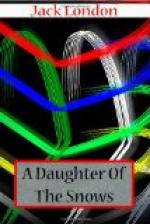Vitality cannot be used over again. If it be expended on one thing, there is none left for the other thing. And so with Vance Corliss. Scholarly lucubrations and healthy exercises during his college days had consumed all the energy his normal digestion extracted from a wholesome omnivorous diet. When he did discover a bit of surplus energy, he worked it off in the society of his mother and of the conventional minds and prim teas she surrounded herself with. Result: A very nice young man, of whom no maid’s mother need ever be in trepidation; a very strong young man, whose substance had not been wasted in riotous living; a very learned young man, with a Freiberg mining engineer’s diploma and a B.A. sheepskin from Yale; and, lastly, a very self-centred, self-possessed young man.
Now his greatest virtue lay in this: he had not become hardened in the mould baked by his several forbears and into which he had been pressed by his mother’s hands. Some atavism had been at work in the making of him, and he had reverted to that ancestor who sturdily uplifted. But so far this portion of his heritage had lain dormant. He had simply remained adjusted to a stable environment. There had been no call upon the adaptability which was his. But whensoever the call came, being so constituted, it was manifest that he should adapt, should adjust himself to the unwonted pressure of new conditions. The maxim of the rolling stone may be all true; but notwithstanding, in the scheme of life, the inability to become fixed is an excellence par excellence. Though he did not know it, this inability was Vance Corliss’s most splendid possession.
But to return. He looked forward with great sober glee to meeting Frona Welse, and in the meanwhile consulted often the sun-picture he carried of her. Though he went over the Pass and down the lakes and river with a push of money behind him (London syndicates are never niggardly in such matters). Frona beat him into Dawson by a fortnight. While on his part money in the end overcame obstacles, on hers the name of Welse was a talisman greater than treasure. After his arrival, a couple of weeks were consumed in buying a cabin, presenting his letters of introduction, and settling down. But all things come in the fulness of time, and so, one night after the river closed, he pointed his moccasins in the direction of Jacob Welse’s house. Mrs. Schoville, the Gold Commissioner’s wife, gave him the honor of her company.
Corliss wanted to rub his eyes. Steam-heating apparatus in the Klondike! But the next instant he had passed out of the hall through the heavy portieres and stood inside the drawing-room. And it was a drawing-room. His moose-hide moccasins sank luxuriantly into the deep carpet, and his eyes were caught by a Turner sunrise on the opposite wall. And there were other paintings and things in bronze. Two Dutch fireplaces were roaring full with huge back-logs of spruce. There was a piano; and




